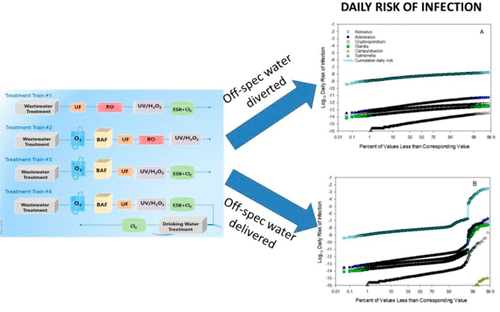当前位置:
X-MOL 学术
›
Environ. Sci. Technol. Lett.
›
论文详情
Our official English website, www.x-mol.net, welcomes your feedback! (Note: you will need to create a separate account there.)
Public Health Implications of Short Duration, Off-Specification Conditions at Potable Reuse Water Treatment Facilities
Environmental Science & Technology Letters ( IF 10.9 ) Pub Date : 2018-10-15 , DOI: 10.1021/acs.estlett.8b00470 Jeffrey A. Soller 1 , Austa M. Parker 2 , Andrew Salveson 2
Environmental Science & Technology Letters ( IF 10.9 ) Pub Date : 2018-10-15 , DOI: 10.1021/acs.estlett.8b00470 Jeffrey A. Soller 1 , Austa M. Parker 2 , Andrew Salveson 2
Affiliation

|
Recycled water is an increasingly important water supply component for many communities. Widespread success with nonpotable reuse, and indirect potable reuse (IPR) such as groundwater injection, has an increasing number of municipalities considering potable reuse without the use of an environmental buffer [direct potable reuse (DPR)]. Previous risk assessment studies have evaluated the microbiological risks associated with potable reuse. However, no studies have rigorously evaluated the potential public health implications of known, infrequent, and short duration, off-specification conditions in advanced water treatment facilities (“off-spec events”). Herein, we couple previously reported data describing the frequency and severity of off-spec events with a microbial risk assessment methodology to quantitatively characterize the public health implications of these off-spec events. The results indicate that these low-probability, short duration, off-spec events in a potable reuse treatment system can drive annual risks; predicted annual median risk differences were increased by up to ∼4 orders of magnitude. The use of accurate monitoring of performance surrogates and diversion [e.g., engineered storage buffer (ESB)] allows for these increased risks to be minimized. These results highlight the importance of understanding water treatment system operations on a real-time basis and point toward managing plant operations and off-spec events in real time to maintain public health protection.
中文翻译:

饮用水回用处理设施持续时间短,不合规格的公共卫生影响
对于许多社区而言,循环水已成为越来越重要的供水组件。非饮用水回用和间接饮用水回用(IPR)(例如地下水注入)的广泛成功,使越来越多的市政当局考虑在不使用环境缓冲液的情况下进行饮用水回用[直接饮用水回用(DPR)]。先前的风险评估研究已经评估了与饮用水重复使用相关的微生物风险。但是,尚无任何研究严格评估先进水处理设施中已知的,不常见的,持续时间短,不合规格的状况对公共卫生的潜在影响(“不合规格的事件”)。在此处,我们将先前报道的描述不合格事件的频率和严重性的数据与微生物风险评估方法结合起来,以定量表征这些不合格事件对公共卫生的影响。结果表明,在可重复使用的饮用水处理系统中,这些低概率,持续时间短,不合规格的事件可能会引发年度风险。预测的年度中位数风险差异增加了约4个数量级。对性能代理和转移[例如,工程存储缓冲区(ESB)]的精确监视的使用可以使这些增加的风险最小化。这些结果凸显了实时了解水处理系统运行的重要性,并指向实时管理工厂运行和不合格事件以维护公共健康保护。
更新日期:2018-10-16
中文翻译:

饮用水回用处理设施持续时间短,不合规格的公共卫生影响
对于许多社区而言,循环水已成为越来越重要的供水组件。非饮用水回用和间接饮用水回用(IPR)(例如地下水注入)的广泛成功,使越来越多的市政当局考虑在不使用环境缓冲液的情况下进行饮用水回用[直接饮用水回用(DPR)]。先前的风险评估研究已经评估了与饮用水重复使用相关的微生物风险。但是,尚无任何研究严格评估先进水处理设施中已知的,不常见的,持续时间短,不合规格的状况对公共卫生的潜在影响(“不合规格的事件”)。在此处,我们将先前报道的描述不合格事件的频率和严重性的数据与微生物风险评估方法结合起来,以定量表征这些不合格事件对公共卫生的影响。结果表明,在可重复使用的饮用水处理系统中,这些低概率,持续时间短,不合规格的事件可能会引发年度风险。预测的年度中位数风险差异增加了约4个数量级。对性能代理和转移[例如,工程存储缓冲区(ESB)]的精确监视的使用可以使这些增加的风险最小化。这些结果凸显了实时了解水处理系统运行的重要性,并指向实时管理工厂运行和不合格事件以维护公共健康保护。

























 京公网安备 11010802027423号
京公网安备 11010802027423号